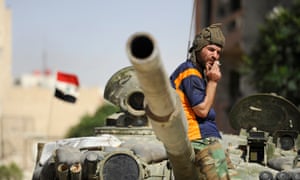
Simon Tisdall is typical of those claiming that the US is working for Assad, in the hope that it will come true, so it might bear a little deconstruction.
'Bashar al-Assad, Syria’s reviled strongman.'
Supposedly this indicates that Tisdall doesn't like Assad, in reality it is a variation on Fisk's "We have been told we have to hate Assad," making out that it is Western propaganda saying he's a bad man.
'Assad remains accused of committing war crimes after last year’s chemical weapons attacks on civilians and other alleged atrocities.'
Yes he does, because he committed them, and still is. To call them accusations and allegations is again to indicate the opposite.
'Nor are the claims of the Syrian propagandists entirely lacking in truth. The US has opened up indirect lines of communication with Damascus in recent weeks. It did not seek permission for this week’s air strikes, but it did inform Assad’s ambassador at the UN in advance of the attacks.'
It told the ambassador that there would be attacks, but not where or when, and stressed there would be no co-operation. Tisdall's claim that the Syrians are propagandists (who would then cease to be such terrible propagandists) is lacking in truth.
'Since then, a great deal of water has passed under the bridge. Mr Cameron, whose grasp of Middle Eastern politics is negligible, has changed sides. Attacking President Assad is no longer his priority. He now wants to intervene on the side of the Syrian government, against that same murderous band of fanatics.'
I'm not even going to check if there's any more to Peter Oborne's claim.
'Further evidence that Obama and Assad are now on the same team is evinced from this week’s simultaneous US air strike on the Khorasan group, part of the al-Qaida-affiliated Jabhat al-Nusra Front and Assad’s sworn foe. “Supporters of the Syrian government say hitting the Nusra Front is proof that the US has switched sides,” the New York Times reported. “‘Of course coordination exists,’ said a pro-government Syrian journalist speaking on the condition of anonymity. ‘How else do you explain the strikes on Nusra?’ ” '
Of course Tisdall's Assadist contacts will say that. I'd explain the attacks, unco-ordinated with Assad, as down to America's dislike of al-Qaida style groups it fears might attack it, whether the intelligence turns out to be any good, or this Khorasan group turns out to be an invention.
'Obama’s Arab allies, particularly Saudi Arabia, the UAE and Qatar, are alarmed that the decision by Washington to dive into the middle of Syria’s civil war could let Assad off the hook. These countries have long demanded a bigger role for the US in ending the Syrian mayhem, but now they have got it, they worry that the Americans are prioritising counter-terrorism ahead of the removal of the Assad regime.
Their hope in adding their military weight to the coalition is that the battle against Isis will morph into a bigger, broader push to end the Syrian civil war, pacify the country as a whole, and create a new, inclusive government in Damascus. Thus for the Gulf states, unlike Britain, France and the US, mission creep is both essential and desirable.'
These two paragraphs sit a bit oddly, as it cuts across the idea that the Americans have been gung-ho. But taking it in the direction that the Gulf states want to drag America into another war, rather than wishing they'd let the Syrian rebels get arms, keeps the narrative that we should be more scared of the US than Assad and ISIS.
'News reports from Damascus say the Syrian army moved this week to take full control of a formerly insurgent-held area north-east of the capital. Hezbollah’s al-Manar TV said the area, Adra al-Omalia, was about 19 miles from central Damascus.'
"News reports". Suddenly it's not propaganda, just news via the sectarian killers of Hezbollah. Dozens of Hezbollah were apparently killed in the Qalamoun today, but any Assad victory can be an indication that he's winning the war when that would more comfortably fit your expectations.
'The advance could be the ominous first instalment of a new push against the pro-western rebels Obama has vowed to support but whose cause is now taking second place to the fight against Isis. The price of victory over Isis may be an Assad victory in Syria.'
So Assad isn't making a priority of the fight against ISIS? What a surprise. One reason I could suggest that this analysis fails is that a final Assad victory over the rebels would destroy Obama's presidency, given the flak he's already getting for the failure to support the Free Syrian Army in 2012.
'All the same, such distortions are to be expected, given the convoluted and confusing twists in American decision-making over the past year. Obama was ready to attack Assad in spring 2013, albeit reluctantly, and was only prevented from doing so by a vote against war in the British parliament.'
It's possible that a sub-editor replaced autumn 2013 with spring 2013, or that Tisdall can't get his basic facts right. I don't think there have been convoluted twists in American policy. They have been faced with a revolution in someone else's sphere of influence, so just as the Soviet Union did with revolts in America's allies, it has offered rhetorical opposition and a little practical support, to maintain influence with the opposition and because it reflects its ideology, but has been concerned to keep the conflict confined within the international state system, and that it takes as few risks with its own forces where its vital interests are not concerned.


















